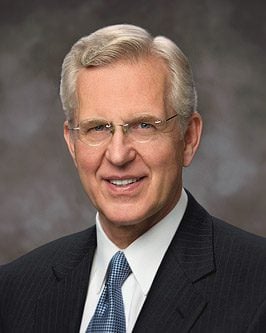
One of the many unattractive traits of our current debased public discourse is the unseemly enthusiasm with which tribal factions eagerly scan the words of those to whom their tribe is opposed, seeking occasions to take offense, express outrage, and justify indignation. Too many zealously try to demonize those with whom they disagree, to portray those who differ from them as evil and depraved. (The irony of such “othering” is especially evident in an era that is so focused on calling out real and imagined discrimination and prejudice connected with skin color, ethnicity, gender, and sexual preferences; differences in ideas, however, often cannot be tolerated at all.)
A recent example of such behavior, it seems clear to me, can be found in certain reactions — and, yes, I’m thinking here of Dr. Pavlov and his salivating dogs — to remarks made by Elder D. Todd Christofferson during the Saturday morning session of the just-concluded 190th Semiannual General Conference of the Church of Jesus Christ of Latter-day Saints.
“Adultery, promiscuity, elective abortion, and out-of-wedlock births are but some of the bitter fruits that grow out of the immorality sanctioned by the sexual revolution,” said Elder Christofferson.
Almost immediately, although I certainly wasn’t looking for them, I began to see howls of rage, claims of deep personal hurt, even sometimes of victimhood, and exclamations of furious disapproval from . . . well, from the usual suspects.
They purported to believe that Elder Christofferson was stigmatizing the children of unmarried parents — in effect, to borrow the once-standard term for such offspring, calling them “bastards.” In the past, such children were routinely marginalized, excluded, humiliated, and mistreated for something done by their parents, something over which they had no control and for which, therefore, they could not be blamed.
Nobody of whom I’m aware wants to go back to those days. I’m quite confident that Elder Christofferson doesn’t. He is a thoughtful, soft-spoken, compassionate, and kind man. What he said cannot reasonably be interpreted as a call for the mistreatment of children born to unmarried parents. It simply cannot.
While nobody wants to return to a time when children were socially ostracized by The Self-Satisfied and Righteous for the perceived misdeeds of their parents, however, some have suggested that the apparent collapse of any and all social stigma against living together and having children out of wedlock might not have been an altogether healthy thing. That is, they suspect that societal disapproval of bringing children into the world without married parents might have a salutary effect in reducing such cases. Their call is for society not to be indifferent to questions of marriage and parenthood, to send a message to potential parents. Not to harm their children. Those calls have been muted, and few and far between, but I confess to harboring sympathy for them. We want to be kind, yes, but we shouldn’t be neutral as to marriage and childrearing. Children aren’t fashion accessories or toys or means to an end.
Plainly — absolutely plainly — Elder Christofferson was saying that illegitimate births are a bad thing. And, from a Latter-day Saint view of sexual morality, they most certainly must be so regarded. However, he wasn’t saying that children so born are bad. He mentioned “illegitimate births,” not “illegitimate children.” He would never, and we as a Church and a people would never, call any child bad or wicked or by nature deserving of exclusion or unkindness. For one thing, multiple passages in our standard works expressly condemn such a wicked judgment. (And before anyone responds that illegitimate births and illegitimate children can’t be separated, consider the case of rape: Surely it’s not inconsistent to denounce rape while refusing to stigmatize any children conceived as the result of sexual assault.)
In lamenting “illegitimate births,” Elder Christofferson was only voicing what most people already know and what innumerable social scientific studies have shown. Few would deny that, on the whole, illegitimate births are unfortunate social phenomena. They aren’t a sign of a healthy community. Few if any delight in the idea of children bearing children, or of children raising children. I’m confident that not many argue that fatherless boys and girls are in an optimal place, or that public policy ought to foster and encourage impoverished female-headed households. Does anybody deny that children should be loved and wanted? Is there anybody who maintains that teenage girls should ideally be forced either to drop out of school or to be traumatized by abortion?
That’s what Elder Christofferson had in mind, when he briefly mentioned “illegitimate births” in his overall remarks about “sustainable societies.”
And it’s disingenuous — to be charitable about the matter — to claim otherwise.
After all, he went right on to say that “Follow-on consequences that work against the sustainability of a healthy society include growing numbers of children raised in poverty and without the positive influence of fathers, sometimes through multiple generations, women bearing alone what should be shared responsibilities, and seriously deficient education as schools, like other institutions, are tasked to compensate for failure in the home.”
And so, though without much hope for success, I call on those who’ve been stoking the fires of indignation regarding Elder Christofferson’s remarks to stop it. I ask them, though not only them, to raise the level of their public discourse. For the sake of a sustainable society.
Posted from Park City, Utah












